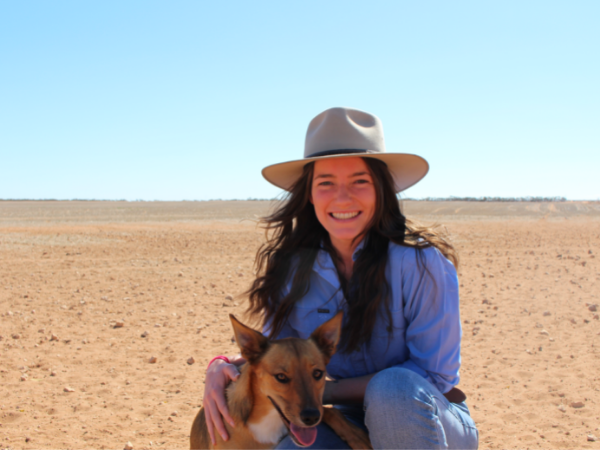Traditionally, individuals who pursued careers in agriculture sought a life on the land, surrounded by paddocks, animals and tractors. But the ever-expanding fields in agriculture and agritech offer so much more than this ‘traditional’ avenue. And this is exactly what Horizon Scholars Matilda Meppem, Paris Capell, Pippa Pryor, Bill Hyem and Demi Taylor are chasing.
In the past, growing up amidst the high-rises of Sydney would have been seen as counterintuitive to a career in agriculture, however Pippa is just one of many young people from non-traditional agricultural backgrounds drawn to the industry.
“I did a farm stay when I was younger and thought it was better than Christmas! Then I went on to study agriculture in high school and was loved learning about technology, how agriculture impacts on climate change and how everything is integrated.
“At university, I’m realising more and more that we need clever people solving the challenges of the future, and agriculture is the future,” Pippa says.
One of the challenges Pippa hopes to solve in the future is the impact of climate change on cattle, with the vision to support her Horizon sponsor, Meat & Livestock Australia (MLA) hit their Carbon Neutral by 2030 target.
Matilda Meppem is sponsored by Grains Research and Development Corporation (GRDC) and her passion for agriculture grew from the grassroots, growing up on a cattle and cropping farm in Western Queensland. Now studying Civil Engineering and Business Management with a focus on the water sector, Matilda is excited to bring her passion for agriculture and science together.
“Water underpins everything we do in agriculture, and something I’m really excited to work with is our ability to harvest data from water. For example, how much water is being absorbed in the soil, how much is running off and more. From there, using technology to take that data and turn it into real results to help farmer’s management practices and decision making is really important.”
Despite being passionate about rural Australia, Paris says agriculture wasn’t a career path that was encouraged for high-achieving school leavers like her.
“I decided to go to university and study environment science, however when I started I realised my heart was in agricultural production. At the time, I had grown an interest in geospatial information systems for vegetation classification and loved that part of remote sensing and that side of agritech.
“I decided to do a major in precision agriculture, which meant I could combine my favourite things and be back in agriculture.”
Paris is sponsored by Cooperative Research Centre for Developing Northern Australia (CRCNA) and believes the agritech revolution might just be the missing piece when it comes to making agriculture an attractive career path.
“I think it signals to high school students that agriculture is not dying or stagnant, we are innovating and thinking outside the box all the time and it is such an exciting place to be.
It’s the limitlessness of agritech that excites Paris, who sees her future in the industry through the lens of the next revolution.
“Since the green revolution, we haven’t had a push in agriculture to take us to the next level, particularly in Australia. Slowly our productivity factors are declining due to factors like climate change and COVID-19, and complex supply chains also present their own challenges. I think agritech could be that next revolution, with its ability to provide huge insights into our production systems, quickly and cost effectively,” says Paris.
She sees an opportunity to bridge the gap between technology innovations and adoption on farm and hopes to create a platform that does just that.
“In the future I’d love to create a platform that makes carbon farming and natural capital counting more accessible to farmers.
“I don’t think it has to be as complicated as all the methodologies are now. There are some really simple metrics that can be communicated to break down the barriers to entering those new markets.”
Suffice to say, Paris says there’s a need to change the narrative about what jobs in agriculture look like.
“I think programs like the AgriFutures Horizon Scholarship and evokeAG. Future Young Leaders provide a platform to show that the ecosystem of agriculture is more than just farmers. It’s universities, entrepreneurs and so much more.
“Things like high school agronomy and cattle teams are great, but they don’t articulate how complex the system is and how many disciplines are involved,” Paris explains.
Pippa’s perspective is not dissimilar, suggesting that educating children and teenagers could be key to turning the farmer stereotype on its head.









